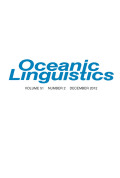
OCEANIC LINGUISTICS
Scope & Guideline
Advancing Understanding of Oceania's Linguistic Heritage
Introduction
Aims and Scopes
- Austronesian Language Structures:
The journal primarily addresses the structural aspects of Austronesian languages, including phonology, morphology, syntax, and semantics, offering insights into the unique grammatical frameworks of these languages. - Historical and Comparative Linguistics:
A significant focus is on the historical development and comparative analysis of Austronesian languages, examining language change, contact, and the reconstruction of proto-languages. - Fieldwork and Documentation:
Oceanic Linguistics encourages field-based research that documents lesser-studied languages and dialects, contributing to the preservation of linguistic diversity in the region. - Cultural and Sociolinguistic Contexts:
The journal explores the intersection of language with culture and society, investigating how linguistic practices reflect and shape social identities and cultural narratives. - Typological Studies:
It also engages in typological investigations that compare linguistic features across Austronesian languages, contributing to broader discussions in linguistic typology.
Trending and Emerging
- Phonetic and Phonological Variation:
There is an increasing focus on the phonetic and phonological aspects of Austronesian languages, with studies investigating sound changes, phonetic features, and their implications for morphosyntax, reflecting a growing interest in the interplay between phonetics and grammar. - Language Contact and Borrowing:
Recent works have explored the dynamics of language contact and borrowing, particularly within multilingual contexts. This theme is critical as it sheds light on how languages influence one another and adapt over time, especially in regions with high linguistic diversity. - Cognitive and Semantic Approaches:
Emerging research emphasizes cognitive and semantic dimensions of language, examining how meaning is constructed and understood in various linguistic contexts. This trend suggests a shift towards exploring the cognitive processes underlying language use. - Social and Cultural Linguistics:
There is a growing interest in the sociolinguistic aspects of language, including how language functions within cultural narratives and identity formation. This reflects an increasing awareness of the role of language in social contexts and its impact on community dynamics. - Typological and Comparative Analyses:
The trend towards typological studies has gained momentum, with researchers comparing linguistic features across different Austronesian languages to identify patterns and divergences, enriching the understanding of language family relationships.
Declining or Waning
- Morphological Studies:
There has been a noticeable decrease in the number of papers focusing specifically on morphological analysis. While morphology remains a critical aspect of language study, fewer recent contributions delve deeply into this area, suggesting a potential shift towards other linguistic domains. - Phonological Theory Applications:
The application of phonological theories to Austronesian languages has seen reduced frequency. Although phonological studies are still present, there is a growing inclination towards applying findings to broader sociolinguistic or typological contexts, rather than purely theoretical explorations. - Diachronic Linguistics:
Research centered on diachronic linguistics, particularly the historical development of specific languages, has become less prevalent. This decline may indicate a shift towards more synchronic approaches or applied linguistic studies that prioritize current language use over historical reconstruction.
Similar Journals

JOURNAL OF EAST ASIAN LINGUISTICS
Connecting Scholars through East Asian Language StudiesJOURNAL OF EAST ASIAN LINGUISTICS, published by SPRINGER, is a premier academic journal that focuses on the rich and diverse linguistic phenomena from East Asia. With an ISSN of 0925-8558 and an E-ISSN of 1572-8560, this journal has steadily contributed to the fields of linguistics and the history and philosophy of science since its inception in 1992. Operating from its base in the Netherlands, the journal is recognized for its impactful research, holding a Q2 category ranking in both the History and Philosophy of Science and Linguistics and Language. It boasts an impressive standing in Scopus rankings, highlighting its relevance and contribution to the academic community with a 66th percentile ranking in Language and Linguistics. The journal is not currently open access, ensuring a rigorous peer-review process that elevates the quality of published articles. By bridging theory and empirical research, the JOURNAL OF EAST ASIAN LINGUISTICS plays a vital role in advancing knowledge in linguistics, making it an essential resource for researchers, professionals, and students interested in East Asian languages and their complexities.

LINGUISTIQUE
Advancing Research in Language StudiesLINGUISTIQUE, an esteemed journal published by PRESSES UNIV FRANCE, serves as a vital platform for scholarly discourse in the fields of linguistics and language studies. With its ISSN 0075-966X and E-ISSN 2101-0234, this French journal has been a significant contributor to the understanding of linguistic phenomena since its inception in 2004, and it continues its journey through to 2024. Although currently categorized in the Q4 quartile for both Arts and Humanities (miscellaneous) and Linguistics and Language, its commitment to publishing quality research encourages a diverse range of articles, reviews, and innovative studies. Positioned in the 32nd and 29th percentiles for its respective fields according to Scopus rankings, LINGUISTIQUE is dedicated to advancing knowledge and stimulating engagement among researchers, professionals, and students alike. While it does not offer open access, the journal remains an essential resource for those who seek to deepen their understanding of linguistic principles in a global context, facilitating a richer discourse that connects theory with practice.

Italian Journal of Linguistics
Fostering scholarly discourse in the heart of linguistics.Italian Journal of Linguistics is a prominent academic journal published by PACINI EDITORE, dedicated to advancing the understanding of linguistic theory and application. With its inception in 1996, the journal has fostered scholarly discourse and continues to contribute to the field through rigorous peer-reviewed articles. Operating under the prestigious field of linguistics, the journal currently holds a respectable Q3 quartile ranking as of 2023, showcasing its relevance in the academic community. It also ranks in the top 30% of journals in both Arts and Humanities and Social Sciences disciplines, reflecting its impactful contributions documented in Scopus rankings. While the Italian Journal of Linguistics is not an open-access journal, it offers invaluable insights and innovative research findings, making it an essential resource for researchers, professionals, and students keen on exploring the nuances of language and linguistics. Based in Pisa, Italy, the journal serves as a significant platform for both contemporary studies and classic investigations in linguistics, appealing to an international audience devoted to this ever-evolving field.

Studi e Saggi Linguistici
Connecting Scholars in the Evolving World of LinguisticsStudi e Saggi Linguistici is a distinguished academic journal published by EDIZIONI ETS, based in Pisa, Italy. With its ISSN 0085-6827, this journal has established itself as a vital resource in the field of linguistics, particularly noted for its contributions since its inception in 2016. Although currently categorized in the lower quartile (Q4) by the 2023 metrics in the domains of Linguistics and Language within Scopus, it remains a significant platform for innovative research and critical discussions surrounding language studies. Focusing on both theoretical and practical aspects of linguistics, the journal serves as a nexus for scholars and practitioners alike, facilitating a rich interchange of ideas and knowledge in a rapidly evolving discipline. As an invaluable publication for researchers, professionals, and students, Studi e Saggi Linguistici is committed to advancing the understanding of linguistic phenomena and fostering scholarly communication in its field.
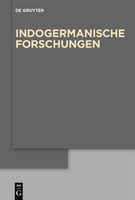
INDOGERMANISCHE FORSCHUNGEN
Exploring the Depths of Indo-European LinguisticsINDOGERMANISCHE FORSCHUNGEN is a prominent academic journal, published by WALTER DE GRUYTER GMBH, focused on the field of linguistics and language studies. With an impressive history that dates back to 1892, this journal has been a vital resource for researchers and professionals exploring the intricacies of Indo-European languages. Although it does not offer open access, its comprehensive and rigorous articles—published in both print (ISSN: 0019-7262) and electronic formats (E-ISSN: 1613-0405)—are instrumental for anyone delving into historical linguistics and comparative studies. The journal currently holds a Q3 ranking in Linguistics and Language, indicating its significance within the academic community, as evidenced by its Scopus rankings in both the Arts and Humanities and Social Sciences domains. Spanning decades of scholarship, INDOGERMANISCHE FORSCHUNGEN plays a pivotal role in advancing the study of language and is essential for scholars aiming to contribute to the dialogue in this ever-evolving discipline.
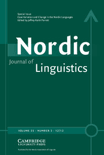
Nordic Journal of Linguistics
Pioneering insights into the evolution of language.Nordic Journal of Linguistics, published by Cambridge University Press, serves as a prominent platform for the dissemination of cutting-edge research in the field of linguistics. Established in 1978 and spanning over four decades, the journal has curated a rich repository of scholarly work that reflects the dynamic and evolving nature of language studies. With an impressive Q2 ranking in both the Linguistics and Language category and a commendable performance in Scopus rankings, placing it at the 74th percentile among Arts and Humanities, the journal is recognized for its high academic standards and impact on contemporary linguistic research. Scholars and practitioners can access a variety of studies that delve into different languages, linguistic theories, and methodologies, fostering broader understanding and dialogue within the linguistic community. Although the journal does not currently offer open-access options, it remains an invaluable resource for researchers, professionals, and students keen on advancing their knowledge of language and linguistics.
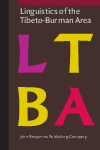
Linguistics of the Tibeto-Burman Area
Connecting Cultures Through Tibeto-Burman Language ScholarshipLinguistics of the Tibeto-Burman Area is a premier journal dedicated to the study and exploration of the Tibeto-Burman languages, offering a significant platform for researchers, scholars, and practitioners in the field of linguistics. Published by John Benjamins Publishing Co, this journal not only maintains rigorous scholarly standards but also aims to contribute to the understanding of language diversity and evolution within the Tibeto-Burman region. With an impressive Q2 ranking in linguistics and language, it ranks in the 49th percentile within Arts and Humanities and the 45th percentile in Social Sciences, highlighting its relevance and quality in the academic community. Since its inception in 2011, the journal has been at the forefront of disseminating research that encourages interdisciplinary dialogue and fosters insights into language structure, use, and cultural implications. Though not an open access publication, it remains accessible to institutions and individuals alike, ensuring that vital academic discussions continue. The ISSN for print is 0731-3500 and for the electronic version, 2214-5907, facilitating the work of the growing scholarly community engaged in Tibeto-Burman linguistics.
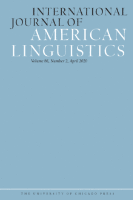
INTERNATIONAL JOURNAL OF AMERICAN LINGUISTICS
Elevating Scholarship in American Linguistic Studies.The INTERNATIONAL JOURNAL OF AMERICAN LINGUISTICS, published by University of Chicago Press, is a revered scholarly publication dedicated to the exploration and advancement of linguistic studies, particularly those related to the American linguistic landscape. With an ISSN of 0020-7071 and an E-ISSN of 1545-7001, this journal serves as a vital platform for researchers, professionals, and students interested in the nuances of language, dialects, and linguistic structures through rigorous academic inquiry. The journal has established a commendable impact, reflected in its ranking within the Q2 category in Linguistics and Language and its placements in the Scopus rankings, thereby positioning itself within the 50th to 53rd percentile of its respective fields. While the journal does not provide Open Access options, it continues to be a cornerstone resource for those seeking to expand their understanding of American linguistics, already converging from 1996 to 2024. Through its continued commitment to excellence, this publication remains essential for those aiming to contribute significantly to the field.

Cadernos de Estudos Linguisticos
Fostering collaboration in the realm of linguistic research.Cadernos de Estudos Linguisticos, published by UNIV ESTADUAL CAMPINAS, INST ESTUDOS LINGUAGEM, stands as a pivotal platform in the field of linguistic studies since its inception in 1978. With its commitment to Open Access, this journal fosters the dissemination of cutting-edge research, ensuring that knowledge is accessible to a global audience. This also enhances collaboration among researchers, professionals, and students dedicated to exploring the nuances of language. The journal proudly carries the ISSN 0102-5767 and E-ISSN 2447-0686, attesting to its uninterrupted quality and relevance in linguistic scholarship. By addressing various facets of language studies, including syntax, semantics, and sociolinguistics, this esteemed journal is a vital resource for advancing understanding and innovation in the field.

Journal of Portuguese Linguistics
Bridging Theory and Practice in Portuguese Language ResearchThe Journal of Portuguese Linguistics is an esteemed peer-reviewed academic journal published by UBIQUITY PRESS LTD, dedicated to the exploration of the rich complexities of the Portuguese language and its various linguistic dimensions. With an ISSN of 1645-4537 and an E-ISSN of 2397-5563, this open-access journal has been disseminating valuable research since 2002, ensuring that knowledge is accessible to all scholars, professionals, and students interested in Linguistics. Based in Portugal, it features a distinct focus on the linguistics pertinent to the Portuguese language, facilitating discussions that span theoretical and applied interests. The journal holds a respectable Q3 quartile rank in the field of Linguistics and Language, reflecting its growing significance and contribution to academia, as evidenced by Scopus rankings that place it in the 71st and 68th percentiles in Arts and Humanities as well as Social Sciences. Researchers and practitioners alike will find Journal of Portuguese Linguistics to be an indispensable resource for fostering discourse and innovation in the study of language.